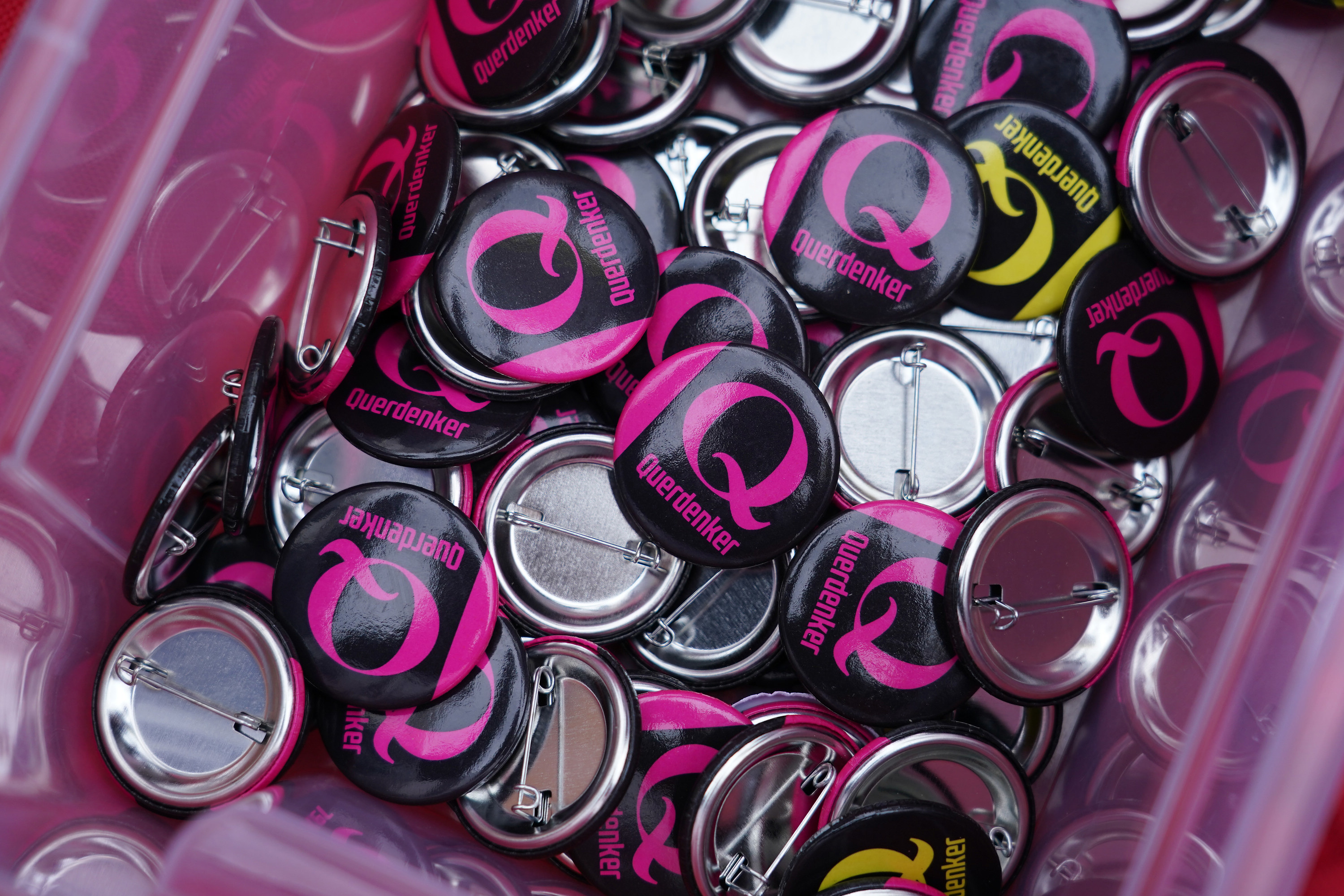
“We literally watched as she became radicalized.”
“The level of heartbreak I felt was unfathomable.”
“It feels like we are losing her to an addiction.”
This is how friends and family of QAnon supporters describe what they’re going through. Most don’t understand how their loved ones could fall for something so unbelievable.
At its core, the QAnon collective delusion is a belief system that began in the innards of the social web before being vomited into the mainstream. Believers sign up for a slew of untruths. Most support Trump, oppose the “deep state,” deny vaccination science, say many instances of gun violence were faked, and set off on quixotic crusades for supposedly trafficked children that hinder the real fight against the issue. Much of their wrath is centered on purported elites who either faked the coronavirus pandemic or spread the virus through 5G technology, a scientific impossibility. Satanism and drinking the blood of children are common points of discussion. Paranoia surrounding Black Lives Matter protests and anti-fascist activists is widespread.
Taken together, the mass delusion seems outlandish, but a recent Pew Research Center survey showed that roughly half of US adults were aware of QAnon. Four in ten Republicans who had heard of it said it was good for the country.
But those numbers are only part of the story. They don’t show the impact the delusion has had on people and their relationships. So, we asked our readers to tell us about the QAnon believers in their lives. Nearly 200 did. Respondents, who mostly said they lived in the United States, ranged in age from 16 to 82. Here’s what you said.

QAnon has ruined lifelong friendships and alienated family members. Those who still speak to one another say their relationships have changed, often beyond repair.
Nobody said any of their loved ones had returned to reality.
“My mom has fallen into the conspiracy beliefs of QAnon,” Samantha, 30, who lives in Texas, told BuzzFeed News. “For months I’ve been trying to bring her back to reality, and I’ve really tried it all.”
Samantha wrote that after her level-headed and college-educated mother became a believer, she could not save her.
“Occasionally, I become emotional because we can’t have any normal conversations anymore,” Samantha wrote. “It helps talking about it with my younger sister, and her solution is always the same — pray about it, so now that’s what I do. I can’t change her beliefs, so I pray and hope that things will get better.”
For many, trouble started in March.
“I feel like I have no idea who he is.”
“Once [my mom] lost her job in March due to the pandemic, she started spending most of her time watching YouTube videos and reading tweets about and from QAnon believers,” wrote Katie, 29, who lives in Alaska. “It's disturbing the things she now believes.”
Another respondent, a 38-year-old from Washington who chose not to provide a name, said their friend of 24 years has always been a “peace, love, and marijuana” kind of guy. The respondent described their friend as someone who didn’t complete high school and was always prone to going down conspiracy rabbit holes. This time was different.
“This all started in March,” they wrote. “I kept telling him that his beliefs are fine with me but his truth was not my truth. He eventually took that as an ultimatum and posted that he ‘lost a friend of 24 years’ on Facebook.”
By April, they stopped speaking.
“It happened so fast,” they wrote. “We were best friends, and now he and his family are people that I used to know.”
“My close friend in Northern California, a father of three, a friendly and well-liked small business owner who hardly posted on Facebook, other than just photos of family, suddenly got crazy active 30 days into corona lockdown,” wrote another respondent. “I feel like I have no idea who he is.”
Over and over, respondents mourned the ends of friendships.
“My (ex) BFF has always been someone I could depend on. In our early adulthood, we both experienced abusive partners and leaned on each other for support,” wrote a person living in California who’s 31 and didn’t provide a name. “We've gotten through life/death situations. Together. She's the only one who has never wavered from my side in 10-plus years.”
The author said their friend’s partner is a QAnon believer who makes his own YouTube videos, which is how she was introduced to it. Now her friend has cut herself off from the outside world. “She doesn't even know what day it is more than half the time.”
“I've lost my best friend,” she said. “My only friend. Her. I don't think she's ever going to come back.”
Susan, 73, who lives in Hawaii, has also seen “a very good friend” become a QAnon supporter.
“We went around and around for a few days with me providing links disproving her beliefs,” Susan wrote. “Finally, she cut me off, and that's fine. We can't continue our friendship with her denying reality.”
Marriages and romantic relationships have been tested. QAnon has driven some couples apart, and those who have stuck around describe having to stay on their toes constantly.
“I lost my partner of eight years to Q,” one person wrote. Their partner stumbled onto QAnon through actor Roseanne Barr, who was following a prominent QAnon account.
“I looked up [the account] and began researching Q and became emotionally upset over what my partner was reading and believing,” the person said. Their relationship ended, but they recently discovered that their former partner was telling people the coronavirus is a hoax.
Another person, who didn’t give their name but said they lived in Atlanta, watched a relationship crumble because of QAnon.
“I am living with and in love with an admitted QAnon believer. There seems to be no way out for a QAnon believer, at least for this particular man.”
“My cousin is divorcing her husband over his obsession with QAnon. It ruined their relationship and became a huge wedge between them,” they said. “It is 100% a digital cult and it's very dangerous. I’m worried about what it will lead to, not only for our own family, but for our society as a whole. It’s really scary.”
Other people said they’re trying to hang on to relationships. Sandra, who lives in North Carolina, said she’s been struggling with her partner’s way of thinking, in particular his belief that Black Lives Matter protests were part of a conspiracy.
“I am living with and in love with an admitted QAnon believer,” she wrote. “There seems to be no way out for a QAnon believer, at least for this particular man. No one else can be right, no one else can be trusted, anyone else who doesn't believe is a sheep and the Great Awakening is coming. It seems to hit on all the resentment he's ever felt about being rejected or left behind or misunderstood or not as powerful/successful as he'd like.”
“I do worry,” she said, “every single day.”
Frédéric, 55, who lives in Belgium, was struggling with a similar situation.
“My partner is spending hours every day in front of her laptop. Coming to bed late in the night with all kinds of wild theories. Using rather bizarre terms to describe what awful [things] she discovered on the net,” he wrote.
He describes his partner reciting false theories about vaccines and microchips, talking about the Clintons drinking children’s blood, and blaming global ills on George Soros, Bill Gates, or the Rockefellers. Attempts to speak with her have been fruitless, he said.
“This poison is troubling our relationship, so we avoid the subject. But this is not the right thing to do, I would like her to wake up from this bad dream and face the world like it is,” Frédéric wrote. “I hope that we in Europe will not turn like the Americans. And I sincerely hope for the US that the country will take another path.”

Across the US, parents are struggling with their children, and children are struggling with their parents.
One respondent described their son joining a militia group and wanting to aid the police as a result of believing in QAnon.
“He believes that the police welcome the assistance that their militia group offers and that his training will prepare him for the coming civil wars,” they said.
Another woman describes being ostracized from her Mexican American family who supports both Trump and QAnon.
“Since I refuse to stay quiet any longer, I’ve been viewed as a highly disrespectful and ungrateful daughter that’s on the brink of being disowned,” she wrote.
Many people describe their parents watching YouTube videos and spending time on Facebook for hours on end.
One person said their dad has bought into almost every conspiracy theory he’s come across in the last four years, including QAnon. “He always sends me links to videos that were ‘recommended to him’ by YouTube’s own algorithm,” they said. “He used to preach about loving/helping everyone no matter their flaws, trials, tribulations and putting yourself in others' shoes. Now I see him using terms like ‘cuck,’ ‘commie,’ and ‘lefty queer.’”
“It’s been a nightmare, honestly,” said another person, whose mom is a QAnon supporter.
“She has changed her voicemail to say that COVID is a hoax, Hollywood is filled with pedophiles, and to vote early for Trump. I was so scared after returning home from the summer visit that I told my boss about it, and told her if I ever go missing to start with my mom and her boyfriend.”
“He believes that the police welcome the assistance that their militia group offers and that his training will prepare him for the coming civil wars.”
A divorced couple's previously successful co-parenting has broken down because of QAnon.
“My son is refusing to go to his dad's house,” a woman who declined to be named wrote. “He is always telling me he wants his old dad back, and it has caused my son so much anxiety. It makes me so sad.”
In a twist, one hairdresser wrote in about a client she had to fire because they became a QAnon believer — while another person wrote in to say they had to stop going to their hairdresser for the same reason.
“For the past nine years, I never strayed from our monthly hangouts and 5-hour-long discussions while he was dying my hair,” they wrote. “Then the great quarantine came and I didn't see him for a few months, and when I came skipping into the salon in late May, everything was different.”
Even those who don’t know QAnon followers personally said they’ve come across posts made by acquaintances on social media or seen believers in real life.
Kelly, 33, who lives in Oklahoma City, has dealt with both.
She wrote that her hometown has been “taken over” by supporters. She used to mess with believers online by pretending to “take the bait” and then making up increasingly implausible theories.
“Best way to sum it up,” she wrote, "surreal goddamn nightmare."
